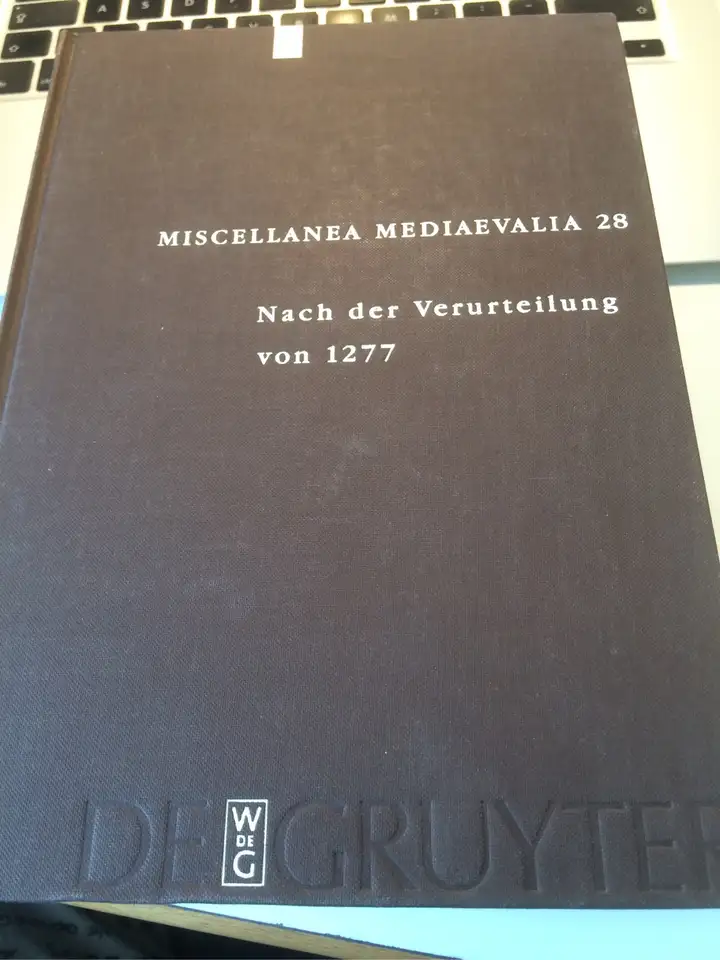1277年的小故事
您好,归伶昌,很抱歉您的回答受到了牵连,您回答过的问题「这世界上有被禁止的知识吗?」因「政治敏感」已被删除。
您被牵连删除的回答如下:
中世纪的话,最有名的是1277的巴黎谴责(Pariser Verurteilungen):当时把持巴黎教区主教职位的奥古斯丁主义主教Étienne Tempier罗列了一系列的(219条)“错误教导”,谁如果教授或者学习这些教导,将会被逐出教会。(Anyone teaching or listening to the listed errors would be excommunicated, unless they turned themselves in to the bishop or the chancellor within seven days, in which case the bishop would inflict proportionate penalties)
一些很有名的被禁止的教导(主要是些亚里士多德和极端亚里士多德主义的东西,不少也是阿奎那的主张)(括号里写的是机翻和我认为可能指向的谴责目标):
Dass der Intellekt aller Menschen ein und derselbe ist an Zahl. 所有人的理智在数量上是一(同一理智理论,阿威罗伊))
Dass Folgendes falsch oder uneigentlich (gesagt) ist: Ein Mensch versteht. (认为人不能真正的和根本地理解(好多人,当代顶尖哲学家))
Dass der Wille des Menschen aus Zwang will oder wählt.(人的意志出于强迫意愿或选择(好多人,当代顶尖哲学家))
Dass alles, was hier auf Erden geschieht, dem Zwang von Himmelskörpern unterliegt. (地上发生的事情都是受天体推动被迫发生的(阿维森纳,占星术))
Dass die Welt ewig ist.(宇宙是永恒的(亚里士多德,当代顶尖哲学家))
Dass es niemals einen ersten Menschen gegeben hat.(从来就没有第一个人(当代顶尖哲学家))
Dass die Seele … vergehe, wenn der Körper vergeht.(形谢神灭(范缜,当代顶尖哲学家))
Dass die nach dem Tode abgetrennte Seele nicht unter körperlichem Feuer leidet.(死后与身体分离的灵魂不会承受有形体的火(Siger von Brabant?))
Dass der freie Wille ein passives, nicht aktives Vermögen ist und dass er durch Zwang von dem, was er erstrebt, bewegt wird.(自由意志是被动的而不是主动的能力,并受其所欲求的东西所迫而运动(当代顶尖哲学家))
Dass Gott nicht Einzeldinge erkennt.(神不认识个别事物(阿奎那))
Dass Gott nicht von sich anderes erkennt.(神不认识除了自己之外的事物(亚里士多德主义?))
Dass menschliche Handlungen nicht durch göttliche Vorsehung geleitet werden.(人的(个别?)行动不受神的预定所引导(……可能是阿奎那?))
Dass Gott nicht Unsterblichkeit oder Unvergänglichkeit einer sterblichen oder vergänglichen Sache geben kann.(神不会给予可死者和可朽者以不死或不朽(不会编,爱谁谁))

听说要有参考文献才有逼格,好啊,那我就去SEP偷一个(说得好像列了就有人会去找来看以及就找得到一样):
Editions and translations
Anzulewicz, Henryk. “Eine weitere Überlieferung der Collectio errorum in Anglia et Parisius condemnatorum im Ms. lat. fol. 456 der Staatsbibliothek Preussischer Kulturbesitz zu Berlin,” Franziskanische Studien, 74 (1992): 375–99.
Denifle, H. and E. Châtelain (eds.), Chartularium Universitatis Parisiensis, vol. 1, pp. 543–558, Paris, 1889.
Flasch, Kurt. Aufklärung im Mittelalter? Die Verurteilung von 1277, Frankfurt, 1989.
Grant, Edward, A Source Book in Medieval Science, Cambridge, MA, 1974.
Mandonnet, P. Siger de Brabant et laverroïsme latin au XIIIe siècle, 2 vols., Louvain, 1908–11, especially vol. 2, pp. 175–191.
Piché, D. (ed.), La condemnation parisienne de 1277. Texte latin, traduction, introduction et commentaire, Paris, 1999.
Studies
Aertsen, Jan A., Kent Emery, Jr. and Andreas Speer (eds.), 2001. Nach der Verurteilung von 1277. Philosophie und Theologie an der Universität von Paris im letzen Viertel des 13. Jahrhunderts. Studien und Texte, Berlin, New York. [multilingual volume with an excellent state of the art introduction in English]
Bianchi, Luca, 1990. Il vescovo e i filosofi: La condanna parigina del 1277 e levoluzione dellaristotelismo scolastico, Bergamo.
–––, 1998. “1277: A Turning Point in Medieval Philosophy?,” in: Jan A. Aertsen and Andreas Speer (eds.), Was ist Philosophie im Mittelalter?, Berlin, New York, pp. 90–110.
Dales, Richard C., 1984. “The Origin of the Doctrine of the Double Truth,” Viator, 15: 169–79.
De Libera, Alain, 1991. Penser au Moyen Âge, Paris.
–––, 1998. “Philosophie et censure. Remarques sur la crise universitaire parisienne de 1270–1277,” in: Jan A. Aertsen and Andreas Speer (eds.), Was ist Philosophie im Mittelalter?Berlin, New York, pp. 71–89.
Duhem, P. 1906–1913 Études sur Leonard de Vinci, 3 vols., Paris.
Grant, Edward, 1979. “The Condemnation of 1277, Gods Absolute Power, and Physical Thought in the Late Middle Ages,” Viator, 10: 211–44.
–––, 1996. The Foundations of Modern Science in the Middle Ages. Their Religious, Institutional, and Intellectual Contexts, Cambridge.
Hissette, Roland, 1977. Enquête sur les 219 articles condamnés à Paris le 7 mars 1277, Louvain.
–––, 1982. “Albert le Grand et Thomas dAquin dans la censure parisienne du 7 mars 1277,” inStudien zur mittelalterlichen Geistesgeschichte und ihren Quellen, ed. Albert Zimmermann, pp. 229–237, Berlin.
–––, 1990. “Note sur le syllabus ‘antirationaliste’ du 7 mars 1277,” Revue Philosophique de Louvain, 88: 404–16.
–––, 1998. “Thomas dAquin compromis avec Gilles de Rome en mars 1277,” Revue dHistoire Ecclésiastique,” 93: 5–26.
–––, 1998. “Thomas dAquin directement visé par la censure du 7 mars 1277? Réponse à John F. Wippel,” in: J. Hamesse (ed.), Roma, Magistra mundi. Itineraria culturae medievalis(Mélanges L.E. Boyle), Louvain-La-Neuve, pp. 425-437.
Mandonnet, Pierre, 1908–1911. Siger de Brabant et laverroïsme latin au XIIIe siècle, 2 vols., Louvain.
Murdoch, John E., 1991. “Pierre Duhem and the History of Late Medieval Science and Philosophy in the Latin West,” in Gli studi di filosofia medievale fra otto e novecento, ed. Alfonso Maier and Ruedi Imbach, Rome, 253–302.
–––, 1998. “1277 and Late Medieval Natural Philosophy,” in: Jan A. Aertsen and Andreas Speer (eds.), Was ist Philosophie im Mittelalter? Berlin, New York, pp. 111–121.
Normore, Calvin G., 1995. “Who Was Condemned in 1277?” The Modern Schoolman, 72: 273–81.
Piron, Sylvain, 2011. “Le plan de lévêque. Pour une critique interne de la condemnation du 7 Mars 1277” Recherches de Théologie et Philosophie médiévales, 78(2): 383–415.
Thijssen, J. M. M. H., 1998. Censure and Heresy at the University of Paris, 1200–1400, Philadelphia.
–––, 1997. “1277 Revisited: A New Interpretation of the Doctrinal Investigations of Thomas Aquinas and Giles of Rome,” Vivarium, 34: 1–29.
Van Steenberghen, Fernand, 1977. Maître Siger de Brabant. Louvain.
–––, 1980. Thomas Aquinas and Radical Aristotelianism, Washington, D.C.
Wielockx, Robert, 1985. Aegidii Romani, Apologia, Florence.
–––, 1988. “Autour du procs de Thomas dAquin.” In Thomas von Aquin. Werk und Wirkung im Licht neurerer Forschungen, ed. A. Zimmermann, 413–38, Berlin.
–––, 1999. “Procédures contre Giles de Rome et Thomas dAquin. Réponse à J.M.M.H. Thijssen,” Revue des sciences philosophiques et théologiques, 83: 293–313.
–––, 1998. “A Separate Process against Aquinas. A Response to John F. Wippel,” in: J. Hamesse (ed.), Roma, Magistra mundi. Iteneraria culturae medievalis (Mélanges L.E. Boyle), Louvain-La-Neuve, pp. 1009-1030.
Wippel, John F., 1977. “The Condemnations of 1270 and 1277 at Paris,” The Journal of Medieval and Renaissance Studies, 7: 169–201.
–––, 1995. Mediaeval Reactions to the Encounter Between Faith and Reason, Milwaukee.
–––, 1995. “Thomas Aquinas and the Condemnation of 1277,” The Modern Schoolman, 72: 233–72.
–––, 1997. “Bishop Stephen Tempier and Thomas Aquinas: A Separate Process Against Aquinas?” Freiburger Zeitschrift für Philosophie und Theologie, 44: 117–36.
本站所有文章、数据、图片均来自互联网,一切版权均归源网站或源作者所有。
如果侵犯了你的权益请来信告知我们删除。邮箱:dacesmiling@qq.com




